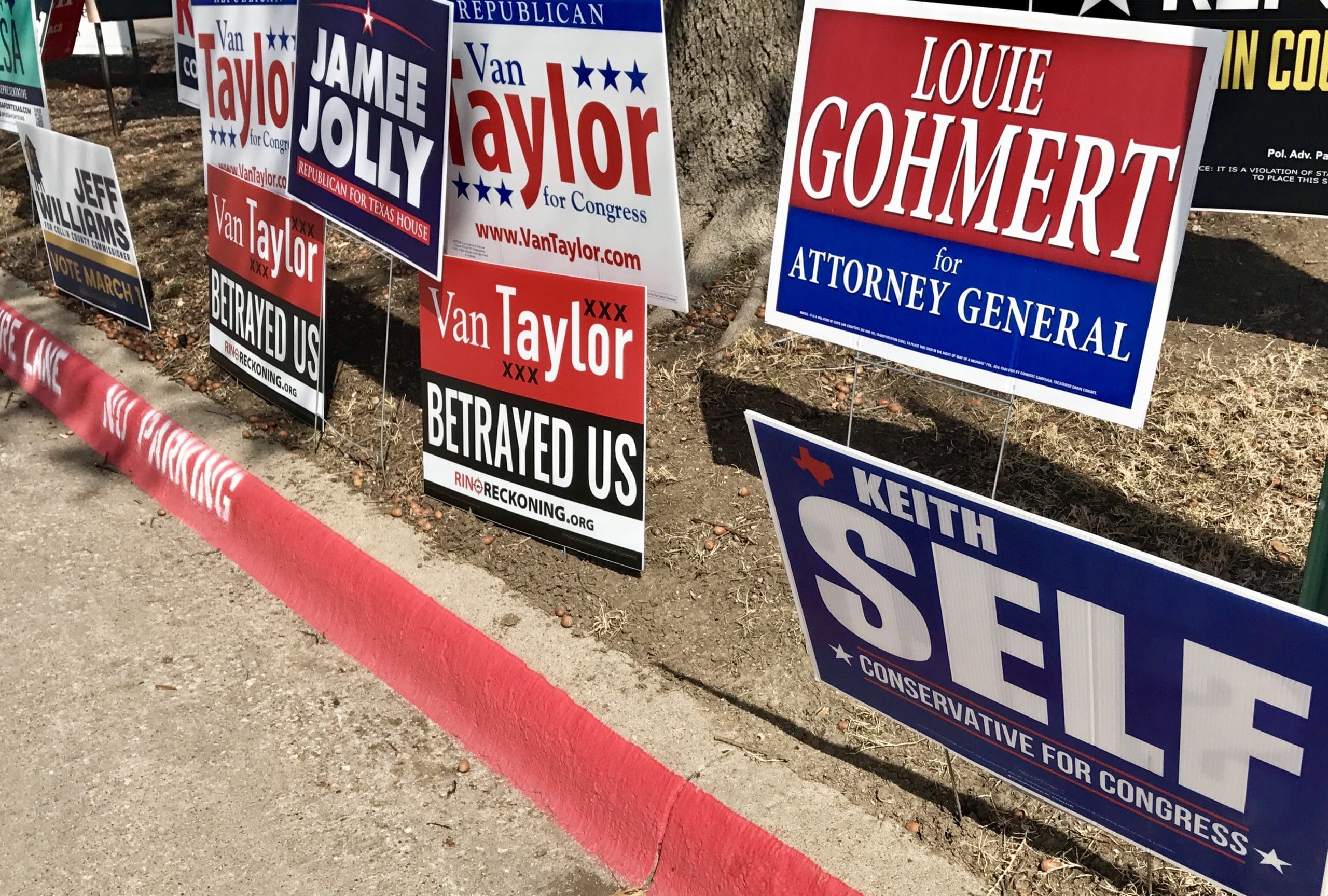UPDATE: Van Taylor has dropped his bid for re-election, handing the Republican nomination to Keith Self.
Original Story:
North Texas U.S. Rep. Van Taylor may not be headed back to Washington, D.C., for a third term, after failing to win a majority of votes in a five-way Republican primary on Tuesday.
The once-popular incumbent received 48.7 percent of the GOP primary vote, according to unofficial results reported by the Texas secretary of state—not enough to become his party’s general-election nominee for Texas’ 3rd Congressional District.
Former Collin County Judge Keith Self finished second, with 26.5 percent, and will face Taylor in a runoff election on May 24.
Whoever wins the runoff is likely to win the seat in November. The newly redrawn congressional district, which covers most of Collin and Hunt counties, is solidly Republican.
“This result is a testament to the fact that voters want to restore integrity to this district and invoke real leadership that will make a difference for Texas families,” Self told Texas Scorecard Wednesday morning.
Taylor drew four primary challengers this year after conservative voters began questioning the incumbent’s commitment to their priorities, saying he changed after going to Washington.
Taylor—a Harvard-educated businessman, Marine Corps veteran, and former state lawmaker from Plano with a reputation as a taxpayer champion—was first elected to Congress in 2018, filling the seat left open when 28-year U.S. Rep. Sam Johnson retired.
He was re-elected in 2020 after running unopposed in the GOP primary.
Once in Washington, Taylor earned the nickname “Mr. Bipartisan” for regularly working with Democrats as part of the Problem Solvers Caucus. He also moved his family to the D.C. area, though he maintains a home in Plano.
In July 2020, Taylor was one of 71 Republicans (six from Texas) who voted with Democrats to remove Confederate statues from the U.S. Capitol—just days after Texas Republicans had made preserving historical monuments a legislative priority.
Then in May of last year, Taylor was one of two Texas Republicans who voted with Democrats to create a bipartisan January 6 commission proposed by House Speaker Nancy Pelosi. Though that independent commission failed to get approval in the Senate, Taylor defended his vote, upsetting even some of his most loyal constituents.
This January, Taylor skipped a candidate debate hosted by the Collin County Republican Party, citing House business in D.C. That gave his opponents a chance to attack his record without him responding.
In the weeks before the primary, attack ads and signs saying “Van Taylor Betrayed Us” began popping up. And over the weekend, a story surfaced of an alleged affair.
Yet Taylor’s campaign held steady.
Taylor defended his voting record, citing high scores on several conservative groups’ ratings. He emphasized he voted against the Democrat-dominated House Select Committee to Investigate January 6 that convened last July.
He also picked up endorsements from several Republican elected officials, and he raised and spent far more money than his opponents.
According to campaign finance reports as of February 9, Taylor spent $1.15 million—ten times as much as his closest Republican competitor, Keith Self, and close to $1 million more than all other candidates in both parties combined.
But it wasn’t enough to win the race.
Self is a West Point graduate who served 25 years in the U.S. Army before running for office.
During his three terms as chief executive of Collin County, he earned a reputation as a fiscal conservative. He also considered running for Congress when Johnson retired, but he deferred to Taylor. Republican activists dissatisfied with Taylor’s recent job performance encouraged Self to take on Taylor this time.
“Here in Texas, he said he was a conservative—but when he went to Washington, he went Washington,” said Self, adding Taylor has “lost his way.”
Turnout in the district’s Republican primary race was almost 13 percent.
The other three candidates were political newcomers. Suzanne Harp picked up almost 21 percent of the vote, while Jeremy Ivanovskis and Rickey Williams drew single digits. The challengers’ combined votes were enough to put Taylor into a runoff with Self.
The runoff winner will face Democrat Sandeep Srivastava and Libertarian Christopher Claytor in the November 8 general election.





